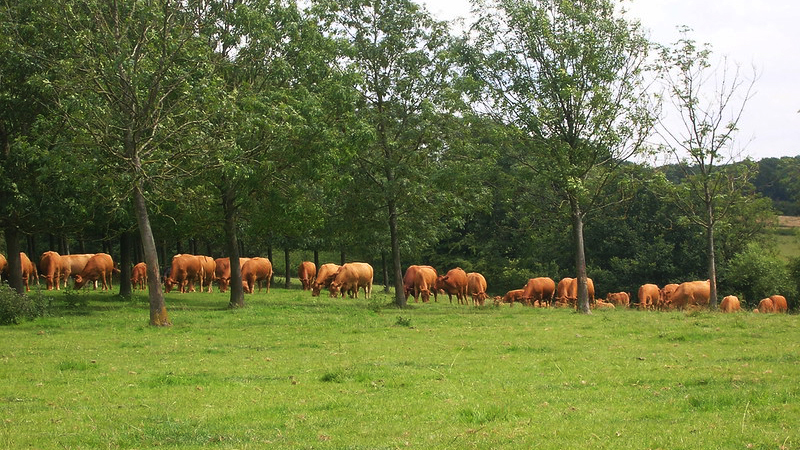A Defra-funded systematic review by a team of progressive UK farming and woodland advocacy organisations points the way to increased adoption of agroforestry by farmers post-Brexit.

An influential new report written by researchers at the Organic Research Centre has been released on why uptake of agroforestry in the UK remains stubbornly low. Agroforestry is simply the planting of trees on agricultural land but farmers usually plant trees with benefits in mind. This can include using trees as a windbreak to prevent soil erosion or using the green parts of trees as fodder for livestock.
3.3% of UK land is currently used for agroforestry: a middling figure compared to other European countries and well behind countries like Portugal with an impressive 13% of its land under agroforestry.
Given the known potential of trees to tackle the biodiversity and climate crisis, a team from the Organic Research Center, the Soil Association, the Woodland Trust, and Abacus Agriculture, were funded by Defra to look into why UK farmers are not currently incentivised to plant trees on their land.
The collaboration is part of a project known as the Agroforestry ELM Test; one of numerous tests and trials currently funded by Defra to design the future environmental land management schemes with farmers and land managers in England. Some of the key English agroforestry farmers helping to monitor and coordinate the six regional clusters of farmers inputting into the Agroforestry ELM Test project are listed at the end of this article. Each of these monitor farmers specialises in a different type of agroforestry, such as silvoarable (incorporating trees into arable) or silvopastoral (livestock with trees). Later in 2021 each monitor farmer and their associated farm clusters will take part in a series of workshops to get to the bottom of what advice and payment incentives are needed to encourage farmers to take up agroforestry within the UK government’s Environmental Land Management (ELM) system.
“This is an important study that clears the waters on agroforestry in the UK. Previous surveys and reviews have looked at parts of the picture, but this is the first study to look at everything that has been published on UK farmer opinion of agroforestry and extract general conclusions. It clarifies directions government needs to take post-Brexit to ensure that sufficient numbers of trees are planted to sequester carbon and boost biodiversity.”
Lead author, Dr Colin Tosh of the Organic Research Centre
The authors of the report, Dr Colin Tosh and Sally Westaway, undertook a systematic review. Dr Tosh explains: “There have been a number of smaller studies over the last ten years looking at farmer attitudes to agroforestry in the UK. This review considered all these studies to extract general conclusions.”
Synthesising ten of the best recent surveys and reviews on agroforestry adoption in the UK, the researchers found that nine of the top ten disincentives to UK farmers adopting agroforestry involve either a lack of farmer knowledge or financial concerns.
Dr Tosh summarises: “Farmers just don’t know they feel enough about agroforestry to go ahead and plant an agroforestry system. The also feel it is a substantial long term financial investment and don’t feel the current incentives and payment systems are sufficient.”
Ben Raskin, Head of Horticulture and Agroforestry at the Soil Association and part of the research consortium behind the report, elaborated on some policy implications of the research: “It’s pretty clear that there will need to be a considerable investment in advice and guidance mechanisms for farmers post-Brexit. Farmers are hungry for more technical information on how to implement and manage agroforestry systems, as well as wanting a better understanding on the financials of including more trees on their farms.”
Helen Chesshire, Lead Farming Advocate at the Woodland Trust and part of the research consortium, goes further. “I believe there is a strong argument for including an explicit agroforestry component in the main farmer payment system to have emerged post-Brexit: the Sustainable Farming Incentive. As it stands currently, I see a distinct possibility of agroforestry falling through the cracks of post-Brexit agriculture policy.”
Chesshire’s comments are echoed by one of the leading agroforestry farmers in the UK, Stephen Briggs, who also advised the research: “The benefits of agroforestry for both the productivity and diversity of my farm have been immense. Farmers are aware of the term “agroforestry” now and I think there is a very strong argument for a more distinct inclusion of agroforestry into UK agricultural policy post-Brexit.”
“I believe there is a strong argument for including an explicit agroforestry component in the main farmer payment system to have emerged post-Brexit: the Sustainable Farming Incentive. As it stands currently, I see a distinct possibility of agroforestry falling through the cracks of post-Brexit agriculture policy.”
Helen Chesshire, Lead Farming Advocate at the Woodland Trust and part of the research consortium
The report “Incentives and disincentives to the adoption of agroforestry by UK farmers: a semi-quantitative evidence review” is free to download from the Organic Research Center here
